Filter by

Advanced Microscopy in Mycology
The aim of this volume is to describe the latest advances in microscopic methods, including integrated techniques, as applied to mycology. Each chapter will provide a brief overview of a particular microscopic method with associated advantages and limitations, the research questions that can be appropriately addressed using these microscopic methods, how it has been successfully applied to addr…
- Edition
- Ed. 1
- ISBN/ISSN
- 978-3-319-22437-4
- Collation
- XII, 164
- Series Title
- Fungal Biology
- Call Number
- 581.1 ADV a
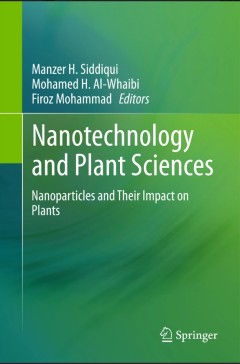
Nanotechnology and Plant Sciences: Nanoparticles and Their Impact on Plants
This book presents a holistic view of the complex and dynamic responses of plants to nanoparticles, the signal transduction mechanisms involved, and the regulation of gene expression. Further, it addresses the phytosynthesis of nanoparticles, the role of nanoparticles in the antioxidant systems of plants and agriculture, the beneficial and harmful effects of nanoparticles on plants, and the app…
- Edition
- 1
- ISBN/ISSN
- 978-3-319-36211-3
- Collation
- XII
- Series Title
- -
- Call Number
- -
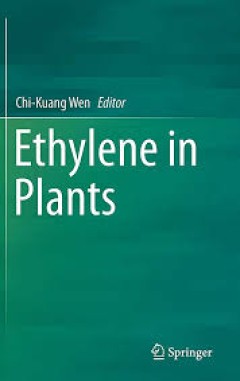
Ethylene in Plants
This book focuses on recent advances in our understanding of the signal transduction pathway of ethylene, its interaction with other hormones and its roles in biological processes. It discusses at which point plants could have acquired ethylene signaling from an evolutionary perspective. Ethylene was the first gaseous hormone to be identified and triggers various responses in higher plants. Our…
- Edition
- -
- ISBN/ISSN
- 978-94-017-9484-8
- Collation
- 6 b/w illustrations, 36 illustrations in colour
- Series Title
- -
- Call Number
- -
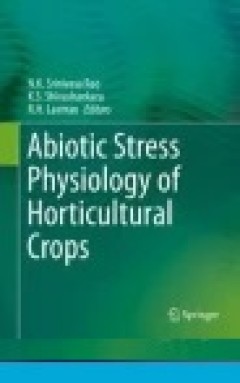
Abiotic Stress Physiology of Horticultural Crops
This book brings together recent advances in the area of abiotic stress tolerance in various vegetables, fruit crops, plantation crops and tuber crops. The main challenges to improving the productivity of horticultural crops are the different types of abiotic stresses generally caused by climate change at the regional and global level. Heat, drought, cold and salinity are the major abiotic stre…
- Edition
- Ed. 1
- ISBN/ISSN
- 978-81-322-2725-0
- Collation
- XIV, 368
- Series Title
- -
- Call Number
- 581 ABI a
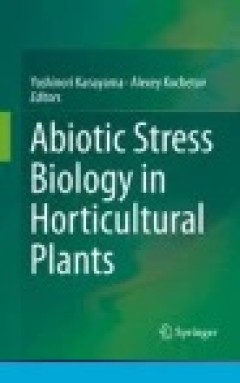
Abiotic Stress Biology in Horticultural Plants
The purpose of this publication is to elucidate the biological aspect of the abiotic stress response from the field to the molecular level in horticultural plants. This book is unique in that it concerns the basic aspect of abiotic stress biology and research progress at the molecular level in model plants or major field crops, as it focuses mainly on the abiotic stress response in existing hor…
- Edition
- Ed. 1
- ISBN/ISSN
- 978-4-431-55251-2
- Collation
- VIII, 220
- Series Title
- -
- Call Number
- 581 ABI a
Reactive Oxygen and Nitrogen Species Signaling and Communication in Plants
This book reviews the current state of information on reactive oxygen and nitrogen species and their role in cell communication during plant growth, development and adaptation to stress conditions. It addresses current research advances made in the area of reactive oxygen and nitrogen species (ROS and RNS) signaling. These free radical molecules are important in plant-microbe interactions, r…
- Edition
- -
- ISBN/ISSN
- 978-3-319-10079-1
- Collation
- -
- Series Title
- -
- Call Number
- 575.5
Reactive Oxygen Species and Oxidative Damage in Plants Under Stress
This book provides detailed and comprehensive information on oxidative damage caused by stresses in plants with especial reference to the metabolism of reactive oxygen species (ROS). In plants, as in all aerobic organisms, ROS are common by-products formed by the inevitable leakage of electrons onto O2 from the electron transport activities located in chloroplasts, mitochondria, peroxisomes …
- Edition
- -
- ISBN/ISSN
- 978-3-319-20421-5
- Collation
- -
- Series Title
- -
- Call Number
- 575.5
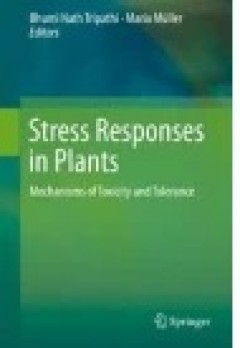
Stress Responses in Plants
This collection discusses the variety of specific molecular reactions by means of which plants respond to physiological and toxic stress conditions. It focuses on the characterization of the molecular mechanisms that underlie the induction of toxicity and the triggered responses and resistances. The nine chapters, all written by prominent researchers, examine heavy metal toxicity, aluminum toxi…
- Edition
- -
- ISBN/ISSN
- 978-3-319-13368-3
- Collation
- -
- Series Title
- -
- Call Number
- -

Natural UV Radiation in Enhancing Survival Value and Quality of Plants
This book is the first of its kind to highlight the positive impact of natural UV radiation on plants through unique adaptations in various metabolic pathways, and provides an evolutionary sketch of the development of molecular mechanisms for protecting plants from solar UV ever since their migration to terrestrial habitats. Experimental evidence is provided for establishing how plants, through…
- Edition
- 1
- ISBN/ISSN
- 978-81-322-2765-6
- Collation
- XIX, 204
- Series Title
- -
- Call Number
- -
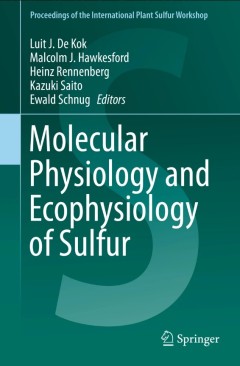
Molecular Physiology and Ecophysiology of Sulfur
This proceedings volume contains a selection of invited and contributed papers of the 9th International Workshop on Sulfur Metabolism in Plants, which was hosted by Heinz Rennenberg, Albert-Ludwigs-University Freiburg and was held at Schloss Reinach, Freiburg-Munzigen, Germany from April 14-17, 2014. The focus of this workshop was on molecular physiology and ecophysiology of sulfur in plants an…
- Edition
- 1
- ISBN/ISSN
- 978-3-319-20136-8
- Collation
- XIII, 265
- Series Title
- Proceedings of the International Plant Sulfur Workshop
- Call Number
- -
 Computer Science, Information & General Works
Computer Science, Information & General Works  Philosophy & Psychology
Philosophy & Psychology  Religion
Religion  Social Sciences
Social Sciences  Language
Language  Pure Science
Pure Science  Applied Sciences
Applied Sciences  Art & Recreation
Art & Recreation  Literature
Literature  History & Geography
History & Geography